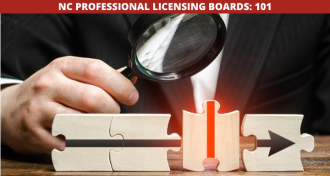
Questions regarding general contractor licensure requirements often arise among affiliated or related companies, namely, which entities are required to have a license.
The issue often arises where a licensed general contractor, whether it be a company or individual, also owns all or part of a related entity that also engages in general contracting. The issue can also arise in other business organization contexts, such as partnerships.
The North Carolina General Statutes define general contracting as follows:
[A]ny person or firm or corporation who for a fixed price, commission, fee, or wage, undertakes to bid upon or to construct or who undertakes to superintend or manage, on his own behalf or for any person, firm, or corporation that is not licensed as a general contractor pursuant to this Article, the construction of any building, highway, public utilities, grading or any improvement or structure where the cost of the undertaking is thirty thousand dollars ($30,000) or more, or undertakes to erect a North Carolina labeled manufactured modular building meeting the North Carolina State Building Code, shall be deemed to be a “general contractor” engaged in the business of general contracting in the State of North Carolina.
Generally speaking, if the work is more than $30,000, a general contractor's license is required. There can be a misconception that the licensure requirements are met if an owner or member of a corporation or limited liability company is licensed or if the work is actually supervised by a related person or entity with a general contractor's license. That is not the case.
For example, assume that Company A holds a general contractor's license. Company A owns 51% of Company B, which does not hold a license. Company B engages in general contracting as defined by the statute under the assumption that it is properly licensed because the majority owner, Company A, is licensed.
In the above-referenced example, Company B does not meet the licensure requirements even though its majority owner, Company A, is properly licensed. This would still be true even if Company A was also involved in overseeing or supervising Company B's work.
To use another example, assume that Company A and B are separate, but both are owned by the same people and use similar names – AAC Company and All About Construction Company – and that only Company A holds a general contractor's license. Again, Company B engages in general contracting as defined by the statute based on a belief by the owners that the license of Company A applies to Company B because of the common ownership and close affiliation.
In this example, the owners again would be wrong. Company B would need to have a separate general contractor's license to comply with the requirement for licensing, even if the people providing oversight are the same.
The statute is clear that each individual person, firm, or corporation that performs work for an owner over $30,000 must have a license. This statute and the related laws and regulations must be strictly followed. This means that each entity that engages in general contracting as defined by the statute must have its own, separate license. This would include corporations, limited liability companies, and partnerships. Joint ventures have somewhat unique requirements in that they can be licensed in their own name or, if not, every principal or member of the joint venture must be licensed to practice general contracting in North Carolina.
This is an issue that the North Carolina Licensing Board for General Contractors ("Board") takes very seriously. Failure to strictly follow the licensing requirement can have dire consequences for each of the persons and companies involved and result in disciplinary action by the Board. If violations occur, the Board has the power to refuse to renew a license; revoke, suspend, or restrict a license; issue a reprimand; or take other disciplinary action. The Board can also apply to a superior court for a restraining order and injunction to retrain any violations. The unauthorized practice of general contracting is also a Class 2 misdemeanor. In the above-referenced example, the Board could take such actions against the unlicensed contractor (Company B) and potentially the licensed contractor (Company A), particularly if the licensed general contractor (Company A) knowingly allowed its license to be used by Company B.
This is not an issue that contractors can afford to get wrong, particularly when their licenses could be at stake. Ward and Smith has a dedicated Professional Licensing Practice Group that can assist contractors in navigating the nuances of the laws and regulations relating to general contractors and can defend investigations by the North Carolina Licensing Board for General Contractors.
--
© 2025 Ward and Smith, P.A. For further information regarding the issues described above, please contact .
This article is not intended to give, and should not be relied upon for, legal advice in any particular circumstance or fact situation. No action should be taken in reliance upon the information contained in this article without obtaining the advice of an attorney.
We are your established legal network with offices in Asheville, Greenville, New Bern, Raleigh, and Wilmington, NC.








